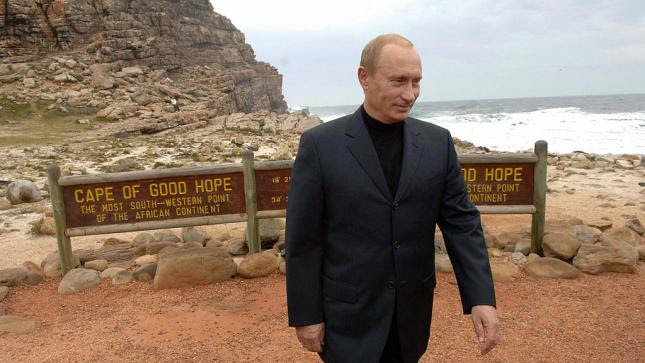The Hill
by Anna Borshchevskaya
Opinion Contributor
photo by: GETTY
The views expressed by contributors are their own and not the view of The Hill.
If you thought Vladimir Putin would settle for only Syria in cementing Russia’s footprint in the Middle East, you’re in for a surprise. From Morocco to Egypt, Moscow has been expanding influence through arms and energy deals, tourism promotion, and diplomatic overtures to warm relations and slowly dislodge U.S. influence in North Africa.
Since Vladimir Putin officially came to power in Russia in May 2000 he systematically sought to restore the positions Moscow lost after the fall of the Soviet Union and the turbulent decade that followed. In the Middle East, Putin made visible strides by 2010. In North Africa, improvements became apparent more recently.
Russia-Egypt ties, already on the rise in Putin’s earlier years, noticeably improved after Abdel-Fattah al-Sisi led the military coup of July 2013 that ushered him into the Egyptian presidency. Bilateral trade between the two countries doubled to $5.5 billion in 2014, according to Russian statistics. Russia and Egypt held their first joint naval drills in June 2015, and military exercises in October 2016. This month, Cairo finalized negotiations with Moscow to build Egypt’s first nuclear power plant.
Reportedly, Moscow had deployed special forces to Egypt on the Libyan border in March of this year, which signaled Russia’s growing role in Libya, a country with the world’s ninth largest oil reserves.
Here Putin is backing General Khalifa Haftar who controls the country’s oil-rich east but seeks leadership of the entire country at the expense of the U.N.-backed civilian government in Tripoli. Moscow offers Haftar diplomatic and military support. Haftar made three trips to Moscow since the summer of 2016, and in February of this year, the Kremlin flew several dozens of Haftar’s wounded soldiers to Moscow for treatment.
In June 2015, Moscow signed a Memorandum of Understanding on nuclear cooperation with Tunisia “(F)or the first time in the history of Russian-Tunisian relations” according to Rosatom, Russia’s state nuclear regulatory corporation. In September 2016 the memorandum grew into a nuclear cooperationagreement. By the end of 2016, when Russian tourists couldn’t travel to Egypt and Turkey, approximately 600,000 came to Tunisia, a tenfold increase from 2015 and a sizable number compared to roughly 3 millionRussian tourists that used to visit Egypt annually.
Algeria has long been in Moscow’s camp and remained a top buyer of Russian arms throughout the 2000s. But in 2014 the two countries signed a $1 billion arms deal which a Russian military expert in business-oriented Vedomosti described as “possibly the largest export contract for main battle tanks in the world.”
Meanwhile, Morocco’s King Mohammed VI came to Moscow in March 2016, his first visit in fourteen years. The two countries signed a number of agreements on energy and counter terrorism, a “deep strategic partnership declaration.” Morocco aims to increase Russia’s tourists by four hundred percent, to an annual 200,000 in the next three years, and on my last visit to Moscow in May 2016 some of the city’s streets sported ads for trips to Morocco.
A major driver for Moscow’s push into Africa is arms sales and economic influence more broadly. Moscow used Syria to advertise newest weapons, and it’s paying off. “Customers have started queuing up for the weapons that have proven themselves in Syria,” said Russian deputy defense minister Yuri Borisov last month.
According to Russian deputy defense minister Alexander Fomin, these customers include African countries, which works well for the Kremlin. The Soviet Union poured resources into the African continent for ideological reasons. Putin will do no such thing. “(W)e know that the African continent has a great potential and it (cooperation) can be market-oriented and based on mutual interest,” he said in October 2016.
Still, the Kremlin’s larger aims are political and geostrategic. Putin’s overall military moves in the Middle East but also North Africa limit the West’s ability to maneuver. North African countries on the Mediterranean’s southern coast can potentially gain Russia, a traditional land power, access to additional warm water ports — something Russian leaders coveted since Peter the Great. Such access would allow Russia to project military power into Europe, Middle East and North Africa.
Russia’s economy is on a long-term declining trajectory and Kremlin’s plans may not pan out exactly as hoped, but can still produce limited success. Moreover, developing closer ties gives the Kremlin political leverage. Cairo has come to accept Moscow’s position in Syria, in support of Moscow-backed Bashar al-Assad.
Backing Haftar in Libya would both gain Putin greater access to energy markets (something he seeks to ensure Europe’s dependence on Russian energy) and cast himself as a peacemaker while preventing a genuine resolution, much as he had done in Syria. Meanwhile, working with Morocco, a crucial US ally in the region, sends a signal to Washington that it will have to deal with Putin here too.
Putin’s priority is regime’s survival. His foreign adventures are often domestic distractions, but survival is also connected to the West— working with it while simultaneously undermining it. North Africa is another crucial arena where he pursues this agenda. Speaking at Russia’s premier annual Valdai conference in October 2016 Putin said that Africa cannot be on the periphery of international relations. On this, Washington should believe him.
Anna Borshchevskaya is the Ira Weiner fellow at the Washington Institute for Near East Policy.







